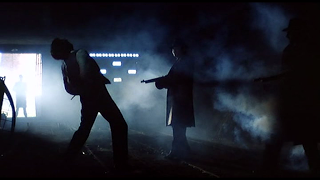 The Godfather's success inspired a rash of mostly forgettable gangster flicks, trading Francis Ford Coppola's artistry for exploitative thrills. Directed by Italian auteur Francesco Rosi, Lucky Luciano (1973) aims to transcend that by marrying organized crime to international corruption.
The Godfather's success inspired a rash of mostly forgettable gangster flicks, trading Francis Ford Coppola's artistry for exploitative thrills. Directed by Italian auteur Francesco Rosi, Lucky Luciano (1973) aims to transcend that by marrying organized crime to international corruption.Charles "Lucky" Luciano (Gian Maria Volonte) heads the American Mafia in the '30s and '40s by exterminating rivals and consolidating Mob families into a commission. He becomes an ally of the US government during World War II, with his lieutenant Vito Genovese (Charles Cioffi) organizing Italian Mafiosi against Benito Mussolini's government. After the war, Luciano is deported to Naples, reinvigorating the international drug trade. Investigators finally get a break when Luciano associate Gene Gianni (Rod Steiger) becomes an informant.
Rosi's film fares weakest when tackling typical gangster tropes. Scenes like Luciano's restaurant ambush of Joe Masseria (admittedly a real incident) and a stylized murder montage smack too much of Coppola. There's little effort at historical verisimilitude in the New York scenes, with modern landmarks clearly visible in the '30s and '40s, despite Piero Picconi's pleasant jazz score. He's much more at home with political intrigue, which is where Lucky Luciano works best.
Lucky Luciano's a successor to Salvatore Giuliano, revisiting the Sicilian mob's postwar resurgence. Decimated by Mussolini, the Mafia returned thanks to America's alliance with Luciano; Genovese appoints mob stooges to government posts as a safeguard against communism, dealing penicillin along with narcotics. American prosecutor Harry Anslinger (Edmond O'Brien) faces Italian attacks and domestic criticism by Thomas Dewey, who as New York's Governor negotiated Luciano's release. Both governments trade recriminations to cover their mutual complicity.
Gian Maria Volonte is electrifying as always, playing Luciano as both grandstanding media figure and shrewd, calculating schemer. His American costars are used more for recognizability than talent. Charles Cioffi, Vincent Gardenia and Larry Gates have brief cameos; Edmond O'Brien's larger role is mostly exposition. Rod Steiger's hamming enlivens his relatively short scenes.
Lucky Luciano isn't Rosi's best work, being a somewhat awkward mix of genres. Nonetheless, its ambition and subversive content places it a tier above the average gangster flick.

